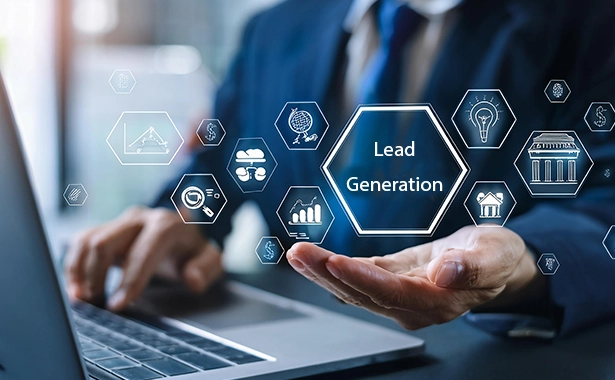Contents
In personal injury cases, due to the fact that such cases are of high importance and mostly involve emotional distress as well as the need to handle them urgently, it is challenging for law firm lead generation to secure a steady stream of clients. Lead generation for personal injury can be managed efficiently with a good mixture of strategies.
Understanding Lead Generation for Personal Injury Law Firms
A. What Is Lead Generation in Legal Practice?
Law firm lead generation involves attracting and nurturing potential clients to secure new business. It is the backbone of business growth, ensuring a steady stream of cases. For personal injury practices, generating leads is especially important, as most cases are one-time engagements. Unlike other industries, lead generation for lawyers requires a balance between visibility and credibility—potential clients need to find you quickly through search and feel confident in hiring you based on your reputation.
Lead generation efforts typically involve a combination of SEO, content creation, ads, and client outreach to connect with prospects at different points in their journey. Law firms must ensure that every lead is handled effectively, with prompt communication and personalized follow-ups. When done right, law firm lead generation drives consistent growth, reducing the downtime between cases.
B. Unique Aspects of Lead Generation for Personal Injury
Lead generation for personal injury comes with specific challenges that make it distinct from other areas of law. Many potential clients reach out during times of emotional distress, often just after an accident. This creates a sense of urgency—if law firms do not engage quickly, clients may move on to another firm. Marketing for personal injury firms must strike the right tone, combining empathy with professionalism.
Additionally, personal injury cases are time-sensitive, making it crucial for lawyers to capture leads efficiently through various channels, including ads and online searches. Potential clients often do not have the luxury of shopping around extensively. Using tools like advanced SEO ensures your law firm shows up at the top of relevant search results, making it easier to connect with prospects when they are actively seeking help.
C. The Buyer’s Journey in Personal Injury Law
Understanding the buyer’s journey helps law firms align their strategies with potential clients’ needs at every step. For personal injury clients, the journey consists of three stages:
- Awareness: At this stage, potential clients recognize they need legal help. They begin their search for personal injury lawyers online or through referrals. Content such as blogs or social media posts plays a critical role in establishing your firm’s presence here.
- Consideration: Once aware of their options, clients start comparing firms. Content like case studies, reviews, and eBooks can highlight your experience and success in personal injury cases. At this point, SEO-optimized pages become crucial in guiding prospects to your site and helping them feel confident in your firm’s expertise.
- Decision: In the final stage, clients decide which lawyer to hire. Personalized outreach, such as phone calls or targeted ads, can make the difference. Automated follow-ups and seamless intake processes ensure leads are converted into clients before they choose a competitor.
Tailoring your marketing approach to each stage of the journey increases conversion rates. Firms that align their content and outreach efforts with these stages see better results from law firm lead generation campaigns.
Effective Strategies for Law Firm Lead Generation
A. Digital Marketing Strategies
- Search Engine Optimization (SEO)
SEO is a fundamental strategy for law firm lead generation. Personal injury lawyers must appear prominently in search results when potential clients look for legal help. Optimizing your website with relevant keywords like “lead generation for personal injury” ensures that your firm gets found by people actively seeking assistance. On-page SEO, such as optimizing page titles, meta descriptions, and content, improves visibility on search engines. Off-page SEO—like backlinks from trusted legal sites—also strengthens your site’s authority.
Local SEO is especially important for marketing for personal injury firms since most clients prefer working with local attorneys. Creating a Google Business Profile, obtaining reviews, and using location-specific keywords increase the chances of appearing in local searches. Ranking high in search results translates directly into more qualified leads for your firm.
- Content Marketing
Content marketing plays a crucial role in law firm lead generation by building trust and positioning your firm as an expert. High-quality blogs, case studies, and videos that address common personal injury issues attract prospects during their search for legal solutions. Creating practical guides and downloadable resources also helps convert website visitors into leads.
Content tailored to the specific needs of personal injury clients, such as articles on accident laws or claim timelines, ensures your firm stays relevant. In addition to boosting SEO, valuable content encourages potential clients to contact your firm when they need legal services. Consistent publishing builds your reputation, and prospects are more likely to engage when they see you as a knowledgeable, trustworthy resource.
- Pay-Per-Click (PPC) Advertising
PPC ads offer an immediate way to generate leads by targeting individuals actively searching for personal injury lawyers. With Google Ads, firms can bid on high-intent keywords like “lead generation for lawyers” or “personal injury attorney near me” to drive traffic to their site. Social media platforms, such as Facebook and Instagram, also provide advertising opportunities to reach specific audiences.
By designing targeted ads that address the urgency of personal injury cases, law firms can capture the attention of potential clients at the right moment. PPC campaigns also provide insights into which keywords and strategies generate the most valuable leads. When integrated with SEO and content marketing, ads ensure a well-rounded approach to digital marketing for personal injury firms.
- Social Media Engagement
Social media platforms allow personal injury firms to engage directly with potential clients and build relationships over time. Facebook, Instagram, and LinkedIn are ideal platforms for lawyers to post informative content, answer questions, and interact with followers. This consistent engagement fosters trust and keeps your firm top-of-mind when prospects need legal help.
Social media also acts as a channel for distributing blog posts and other SEO-optimized content, expanding your reach and driving traffic to your website. In addition to organic engagement, social media ads can target specific demographics likely to need personal injury services. By combining social media engagement with other digital strategies, firms can build stronger connections and generate more quality leads.
B. Traditional Marketing Strategies
- Networking and Referrals
Networking remains a valuable strategy for lead generation for lawyers. Building relationships with other professionals—such as doctors, insurance agents, and other attorneys—creates a network of trusted referral sources. Satisfied clients are also a key source of referrals, especially in personal injury cases, where positive experiences lead to word-of-mouth recommendations.
Networking efforts can be further enhanced through partnerships with local organizations and participation in industry events. A strong referral network can bring in high-quality leads that are more likely to convert because of the trust already established through the recommendation.
- Community Involvement
Community involvement plays a significant role in marketing for personal injury firms. Sponsoring local events, giving seminars on legal rights, or participating in charity efforts raises awareness of your firm and enhances its reputation. Prospects are more likely to remember and trust firms they associate with positive contributions to their community.
Being active in the community not only boosts visibility but also creates opportunities to build meaningful connections with potential clients. Firms that invest in community outreach demonstrate their commitment to local clients, which helps generate more personal injury leads over time.
- Print and Media Advertising
Despite the rise of digital marketing, traditional print and media advertising still have a role in law firm lead generation. Ads in local newspapers, magazines, and radio shows can increase your firm’s visibility, especially among older demographics who rely on these sources for information. For personal injury lawyers, print ads that highlight successful case results or community involvement can build trust with prospects.
When combined with other strategies—such as SEO and social media campaigns—traditional advertising ensures a broad reach. Coordinating ads across print, radio, and digital platforms reinforces your brand, helping prospects recall your firm when they need legal services.
Leveraging Technology for Lead Generation
A. The Role of Legal Software
Modern legal software plays a vital role in law firm lead generation by streamlining operations and integrating marketing efforts. Personal injury firms that rely on manual processes often struggle to follow up on potential leads efficiently. Legal case management software automates key tasks—such as searching for client information, scheduling follow-ups, and managing documentation—freeing up time to focus on acquiring new clients.
By consolidating intake, communication, and task management into a single platform, firms can track their leads more effectively. Automation ensures that no potential client is left waiting, improving response times and enhancing the overall client experience. Seamlessly integrating marketing campaigns with operations also provides personal injury firms with an edge in a competitive market.
B. How RunSensible Enhances Lead Generation for Lawyers
- Advanced Client Intake Management
RunSensible simplifies the intake process, helping law firms efficiently capture and convert leads. With customizable forms tailored to personal injury cases, lawyers can collect relevant details without overwhelming potential clients. This ensures that inquiries gathered from ads, email campaigns, or other outreach efforts flow smoothly into the firm’s system.
Speed and ease are crucial for lead generation for personal injury, where delays may cost the firm a new case. Automated intake workflows make the process more efficient, ensuring each lead is quickly processed and assigned to the right person within the firm.
- Integrated CRM Features
RunSensible’s built-in CRM (Customer Relationship Management) tools help personal injury firms nurture leads from initial contact to client conversion. With automatic follow-ups, reminders, and personalized communication, lawyers can maintain engagement with potential clients throughout the decision-making process.
Tracking the journey of each lead—whether they come from organic search traffic, PPC ads, or referrals—allows firms to make data-driven decisions about their marketing strategies. This insight is essential for effective law firm lead generation, ensuring efforts are focused on the most productive channels.
- Data-Driven Insights
Data analytics provided by RunSensible give law firms a detailed view of lead performance and conversion rates. With access to insights on which ads are driving the most leads or how prospects interact with content, firms can optimize their strategies. For marketing for personal injury firms, these analytics ensure that outreach efforts are aligned with the behaviors of their target audience.
The ability to track SEO metrics, campaign performance, and referral sources ensures that no opportunity is overlooked. This data empowers firms to fine-tune their law firm lead generation strategies over time, improving both efficiency and effectiveness.
Best Practices for Maximizing Lead Conversion
A. Prompt and Personalized Communication
One of the most important aspects of law firm lead generation is responding to inquiries promptly. In personal injury cases, timing can make or break the conversion of leads since clients are often under stress and need immediate legal help. Automated responses, such as confirmation emails or text messages, assure prospects that their inquiry has been received, while personalized communication builds trust and strengthens engagement.
Beyond automation, personal injury firms should aim for direct, meaningful interactions through emails, phone calls, or meetings. Using data gathered from ads and search behavior allows lawyers to tailor their responses to each prospect’s needs, which enhances the chances of converting them into clients. Firms that prioritize prompt, personalized communication outperform competitors in law firm lead generation.
B. Nurturing Leads Through Multiple Touchpoints
Lead generation for personal injury involves maintaining consistent engagement with potential clients throughout their decision-making journey. Prospects may take time to evaluate legal options, so nurturing leads through multiple touchpoints is essential. Combining phone calls, follow-up emails, and social media outreach ensures your firm stays top of mind.
Effective content marketing is also a critical part of nurturing leads. Email campaigns that share relevant content—like case studies or helpful articles—demonstrate your expertise and keep clients engaged. Integrated marketing tools, such as automated reminders, ensure that leads progress through each stage of the funnel without being lost along the way.
A multi-touchpoint strategy is especially effective in marketing for personal injury firms. Since personal injury clients often seek legal advice quickly, providing timely and valuable information at each stage helps guide them toward hiring your firm.
C. Utilizing RunSensible for Effective Follow-ups
RunSensible’s case management software simplifies follow-ups by automating workflows and scheduling reminders, ensuring no lead falls through the cracks. With its integrated CRM features, lawyers can monitor all interactions with prospects—whether they came from organic search, PPC ads, or referrals. This seamless tracking system helps firms maintain consistent communication, which is crucial for lead generation for lawyers.
RunSensible also offers task management tools, helping firms assign follow-up tasks to team members and monitor their progress. By automating repetitive tasks, firms can focus more on high-value activities, such as nurturing personal connections and closing deals. This level of efficiency boosts the success of law firm lead generation by ensuring that each potential client receives timely and professional communication.
Maximizing lead conversion requires a combination of fast responses, personalized engagement, and consistent follow-ups. With tools like RunSensible, personal injury firms can streamline these processes, turning more leads into long-term clients.
Overcoming Common Challenges in Lead Generation
A. Dealing with High Competition
The personal injury sector is highly competitive, with many firms vying for the same leads. To stand out, firms must adopt differentiation strategies by highlighting specific strengths, such as expertise in a particular type of injury or unique client services. Niche specialization can also be an effective way to narrow your target audience and attract high-value leads.
Leveraging SEO is another essential tactic for law firm lead generation in competitive markets. Optimizing your website for keywords like “lead generation for personal injury” and creating high-quality content that answers potential clients’ questions boosts your visibility on search engines. With the right combination of local SEO and targeted ads, your firm can consistently outperform competitors in both organic and paid search results.
B. Ethical Considerations and Compliance
When pursuing lead generation for lawyers, it is critical to comply with legal advertising regulations. Some jurisdictions have strict rules governing how lawyers can market their services, especially in personal injury cases. Marketing for personal injury firms requires careful messaging to avoid overpromising or making guarantees about outcomes.
Building trust through transparent and ethical practices is essential for sustainable lead generation. Rather than aggressive sales tactics, firms should focus on providing valuable content that educates prospects and fosters confidence. Ethical lead generation also ensures long-term client relationships, which result in more referrals and positive reviews—both of which further support law firm lead generation efforts.
C. Time and Resource Constraints
Managing lead generation for lawyers requires significant time and resources, which can strain smaller or mid-sized firms. Without the right tools, personal injury lawyers may struggle to keep up with follow-ups, nurture leads, and track marketing performance. This is where automation plays a key role. By automating tasks such as email campaigns, reminders, and data collection, firms can focus on higher-value activities like consultations and case preparation.
RunSensible helps overcome these challenges by streamlining marketing efforts and administrative tasks. With automated workflows, intake management, and CRM integration, lawyers can track leads from various sources—whether they originate from SEO, ads, or referrals—without missing any touchpoints. Using data-driven insights provided by RunSensible, firms can identify which marketing strategies yield the best results and allocate their resources accordingly.
Overcoming these challenges requires a strategic approach, combining smart marketing practices with efficient use of technology. With tools like RunSensible, personal injury firms can streamline operations, stay compliant, and improve their overall lead conversion, ensuring their law firm lead generation efforts remain productive and effective.
Mastering Lead Generation for Lasting Growth
Effective law firm lead generation requires a blend of strategy, consistency, and technology. Personal injury firms must overcome challenges such as high competition and time constraints by optimizing processes and tailoring their outreach to meet clients’ needs. Leveraging SEO, targeted ads, and engaging content ensures your firm stays visible in search results when prospects are actively seeking legal help. Streamlining intake and follow-ups with automation tools makes it easier to convert potential leads into clients without wasting valuable time.
Marketing for personal injury firms is not just about getting leads—it is about nurturing relationships through personalized, ethical communication. Combining digital strategies like PPC ads with traditional networking efforts creates a well-rounded approach that builds trust and credibility. Firms that proactively monitor performance data and fine-tune their strategies will be better positioned to stay ahead of the competition, ensuring long-term growth through sustained client acquisition.
Streamline your law firm lead generation and convert more personal injury clients with ease. Try RunSensible today and experience powerful, automated tools designed for legal success!
FAQs
- How quickly can I expect to see results from my law firm’s lead generation efforts?
The timeline depends on the strategies used. SEO and content marketing may take a few months to build momentum, while PPC ads and social media campaigns can generate leads almost immediately. - Is RunSensible suitable for small personal injury law firms?
Yes, RunSensible is designed to support firms of all sizes. Its customizable features and automation tools make it ideal for both small practices and larger teams. - Is RunSensible a client intake software?
RunSensible offers more than just client intake. It is a comprehensive legal case management solution that integrates intake, CRM, marketing tools, and task management for seamless operations.
Disclaimer: The content provided on this blog is for informational purposes only and does not constitute legal, financial, or professional advice.








